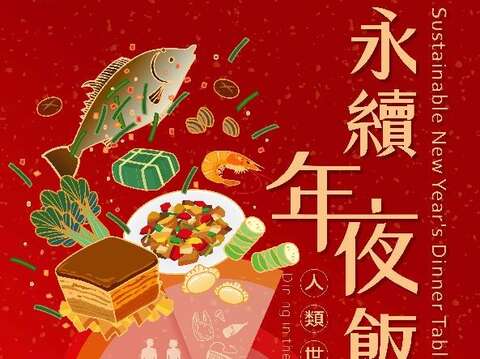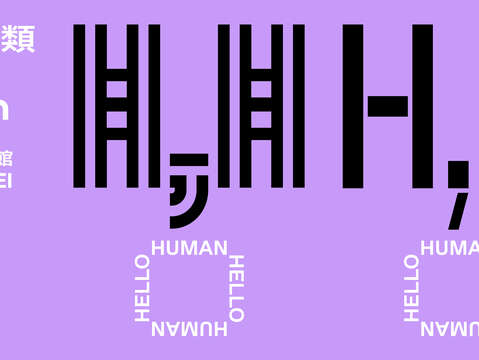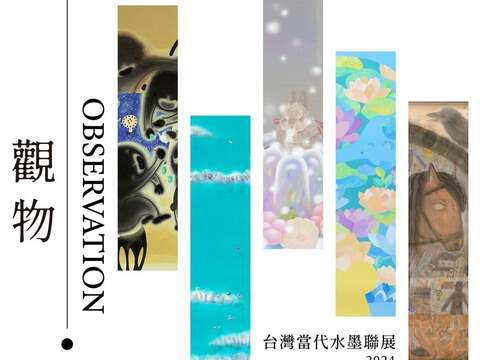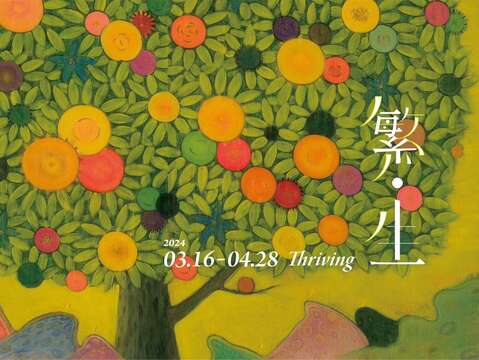Post date:2021-11-02
Updates:2021-11-02
1570
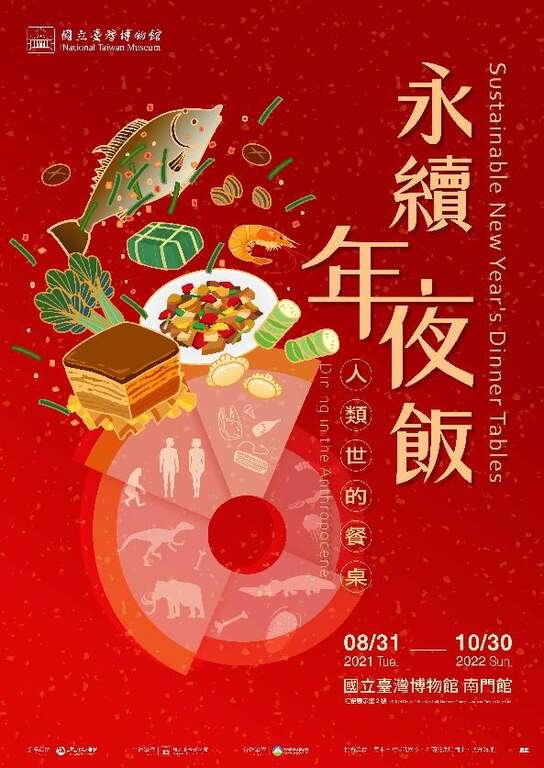
- Event Time
- 2021-08-31~2022-10-30Tuesday-Sunday 9:30 am-5:00 pm
- Event Location
- No. 1, Section 1, Nanchang Road., Zhongzheng Dist., Taipei City Taiwan, R.O.C
Rethinking New Year's Food Traditions for a Sustainable Future
New Year’s Eve dinners display some of the most iconic culinary traditions among Taiwan’s annual festivals. Though commonly deemed to be a part of traditional Han culture, present-day New Year’s Eve dinners have evolved from past iterations under changing cultures and food production systems. Thanks to advancements in fishery technologies and cold-chain equipment, everyone now has access to a variety of seafood on New Year’s Eve. Meat, once a rare and cherished ingredient, has now become a common source of food waste after New Year’s dinners. Moreover, the per capita annual consumption of rice, once considered the most important staple food in Taiwan, has dropped to 45 kg, a 50% decrease from thirty years ago, due to government policies, foreign influences, and the continuous decline of rice cultivation.
Culture is the product of the long-term interaction between people and their environment. Our New Year's food culture reflects our perceptions of the surroundings and foretells the future of the ecological environment. Since 2016, the National Taiwan Museum has annually held the Sustainable New Year’s Table event, inviting the general public to explore the complex and interdisciplinary issues behind family reunion dinners in Taiwan. We hope this exhibition will inspire the audience to reimagine their New Year’s dinner recipes, creating a more sustainable festival dining culture for our future generations.
What is "Anthropocene"?
The environmental impact of human behavior is disconcerting for scientists, thereby giving birth to the term, "Anthropocene". In 2000, Paul J. Crutzen, a recipient of the Nobel Prize in Chemistry, proclaimed at a conference in Mexico that we now live in a new geological era called "Anthropocene," emphasizing the fact that human activity has now become a geological force.
In recent years, many exhibits held in museums across the globe have revolved around the concept of this Anthropocene era, and the term has become a popular topic in Taiwan as well. The scope of discussion on the Anthropocene transcends disasters, environmental resilience, or environmental awareness and is an opportunity for transdisciplinary collaboration and integration of local or traditional knowledge.
Embarking on a Journey of Sustainability for Festival Foods in Taiwan
The celebration of Lunar New Year is a cultural practice observed by the Han Chinese; many different ethnic groups in Taiwan have festivals and cultures of their own. For example, indigenous ethnic groups do not celebrate the Lunar New Year and, instead, hold festivals of varying scale for different seasons and rituals. Indigenous peoples’ festival foods and ritual offerings are reflective of their connection with their surrounding environment, food production methods, and their lifestyle. Learning about the culinary traditions that different ethnic groups observe during festivals can help us better understand the cultural diversity of Taiwan and reflect on the sustainable development of New Year’s Eve dinners, given the influences of commercial trends and industrial production chains.
New Year’s Eve dinners display some of the most iconic culinary traditions among Taiwan’s annual festivals. Though commonly deemed to be a part of traditional Han culture, present-day New Year’s Eve dinners have evolved from past iterations under changing cultures and food production systems. Thanks to advancements in fishery technologies and cold-chain equipment, everyone now has access to a variety of seafood on New Year’s Eve. Meat, once a rare and cherished ingredient, has now become a common source of food waste after New Year’s dinners. Moreover, the per capita annual consumption of rice, once considered the most important staple food in Taiwan, has dropped to 45 kg, a 50% decrease from thirty years ago, due to government policies, foreign influences, and the continuous decline of rice cultivation.
Culture is the product of the long-term interaction between people and their environment. Our New Year's food culture reflects our perceptions of the surroundings and foretells the future of the ecological environment. Since 2016, the National Taiwan Museum has annually held the Sustainable New Year’s Table event, inviting the general public to explore the complex and interdisciplinary issues behind family reunion dinners in Taiwan. We hope this exhibition will inspire the audience to reimagine their New Year’s dinner recipes, creating a more sustainable festival dining culture for our future generations.
What is "Anthropocene"?
The environmental impact of human behavior is disconcerting for scientists, thereby giving birth to the term, "Anthropocene". In 2000, Paul J. Crutzen, a recipient of the Nobel Prize in Chemistry, proclaimed at a conference in Mexico that we now live in a new geological era called "Anthropocene," emphasizing the fact that human activity has now become a geological force.
In recent years, many exhibits held in museums across the globe have revolved around the concept of this Anthropocene era, and the term has become a popular topic in Taiwan as well. The scope of discussion on the Anthropocene transcends disasters, environmental resilience, or environmental awareness and is an opportunity for transdisciplinary collaboration and integration of local or traditional knowledge.
Embarking on a Journey of Sustainability for Festival Foods in Taiwan
The celebration of Lunar New Year is a cultural practice observed by the Han Chinese; many different ethnic groups in Taiwan have festivals and cultures of their own. For example, indigenous ethnic groups do not celebrate the Lunar New Year and, instead, hold festivals of varying scale for different seasons and rituals. Indigenous peoples’ festival foods and ritual offerings are reflective of their connection with their surrounding environment, food production methods, and their lifestyle. Learning about the culinary traditions that different ethnic groups observe during festivals can help us better understand the cultural diversity of Taiwan and reflect on the sustainable development of New Year’s Eve dinners, given the influences of commercial trends and industrial production chains.
 Sustainable New Year's Dinner Tables:Dinning in the Anthropocene
Sustainable New Year's Dinner Tables:Dinning in the Anthropocene